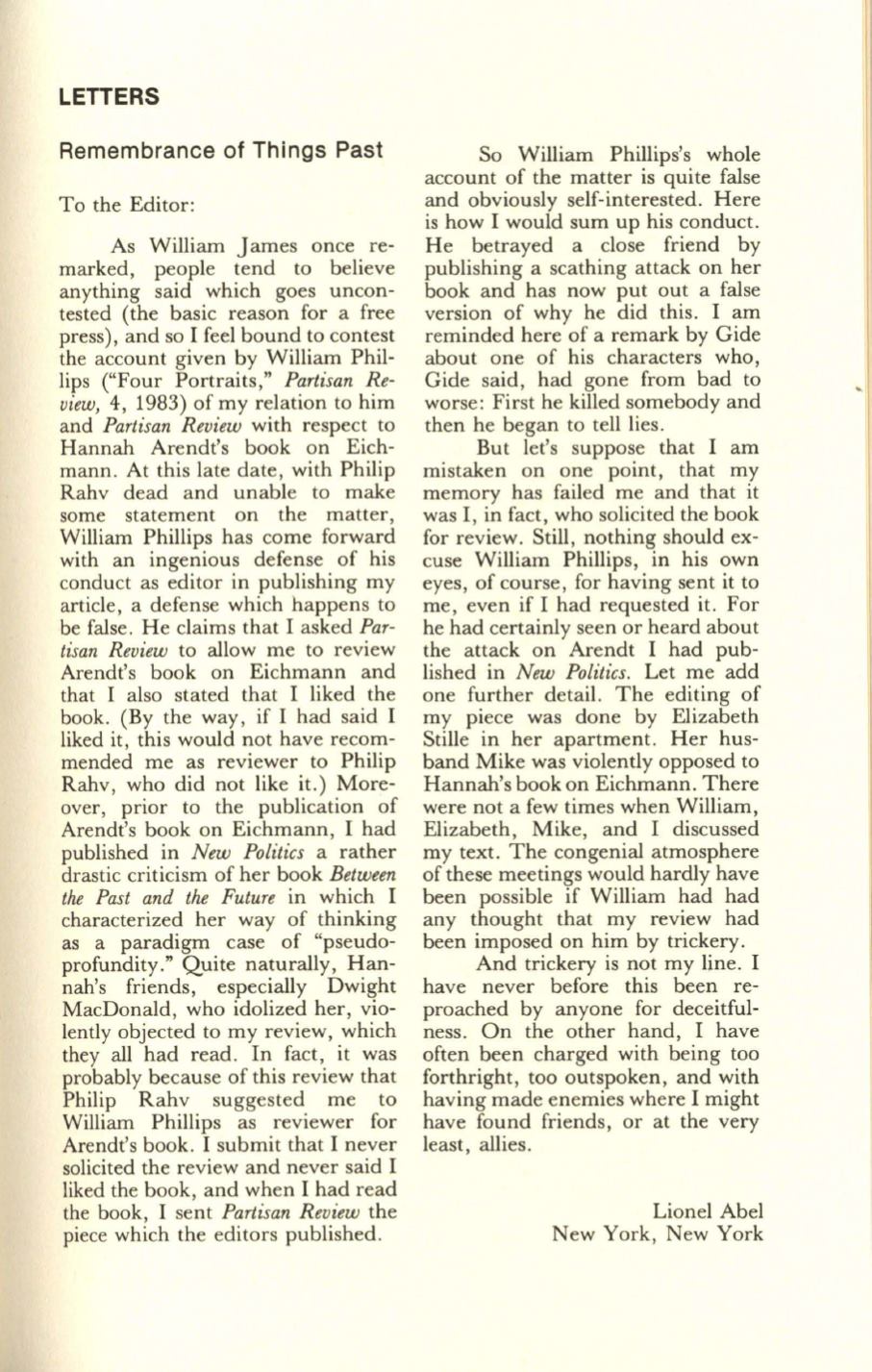
LETTERS
Remembrance of Things Past
To the Editor:
As William James once re–
marked, people tend to believe
anything said which goes uncon–
tested (the basic reason for a free
press), and so I feel bound to contest
the account given by William Phil–
lips ("Four Portraits,"
Partisan Re–
view,
4, 1983) of my relation to him
and
Partisan Review
with respect to
Hannah Arendt's book on Eich–
mann. At this late date, with Philip
Rahv dead and unable to make
some statement on the matter,
William Phillips has come forward
with an ingenious defense of his
conduct as editor in publishing my
article, a defense which happens to
be false. He claims that I asked
Par–
tisan Review
to allow me to review
Arendt's book on Eichmann and
that I also stated that I liked the
book. (By the way, if I had said I
liked it, this would not have recom–
mended me as reviewer to Philip
Rahv, who did not like it.) More–
over, prior to the publication of
Arendt's book on Eichmann, I had
published in
New Politics
a rather
drastic criticism of her book
Between
the Past and the Future
in which I
characterized her way of thinking
as a paradigm case of "pseudo–
profundity." Quite naturally, Han–
nah's friends, especially Dwight
MacDonald, who idolized her, vio–
lently objected to my review, which
they all had read. In fact, it was
probably because of this review that
Philip Rahv suggested me to
William Phillips as reviewer for
Arendt's book. I submit that I never
solicited the review and never said I
liked the book, and when I had read
the book, I sent
Partisan Review
the
piece which the editors published.
So William Phillips's whole
account of the matter is quite false
and obviously self-interested. Here
is how I would sum up his conduct.
He betrayed a close friend by
publishing a scathing attack on her
book and has now put out a false
version of why he did this. I am
reminded here of a remark by Gide
about one of his characters who,
Gide said, had gone from bad to
worse: First he killed somebody and
then he began to tell lies.
But let's suppose that I am
mistaken on one point, that my
memory has failed me and that it
was I, in fact, who solicited the book
for review. Still, nothing should ex–
cuse William Phillips, in his own
eyes, of course, for having sent it to
me, even if I had requested it. For
he had certainly seen or heard about
the attack on Arendt I had pub–
lished in
New Politics.
Let me add
one further detail. The editing of
my piece was done by Elizabeth
Stille in her apartment. Her hus–
band Mike was violently opposed to
Hannah's book on Eichmann. There
were not a few times when William,
Elizabeth, Mike, and I discussed
my text. The congenial atmosphere
of these meetings would hardly have
been possible if William had had
any thought that my review had
been imposed on him by trickery.
And trickery is not my line. I
have never before this been re–
proached by anyone for deceitful–
ness. On the other hand, I have
often been charged with being too
forthright, too outspoken, and with
having made enemies where I might
have found friends, or at the very
least, allies.
Lionel Abel
New York, New York


